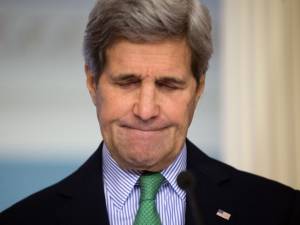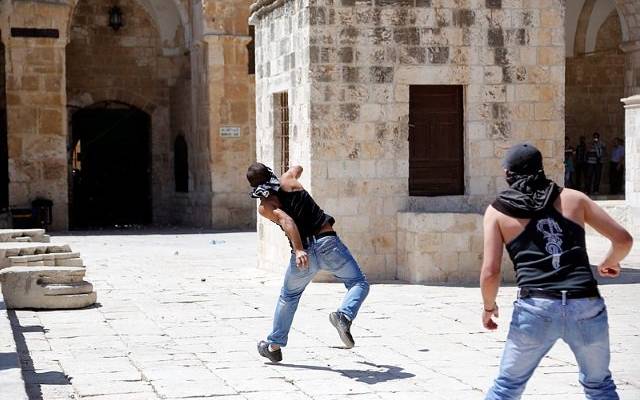The Jordanian decision could deal an embarrassing blow to Kerry, who had hailed the deal when it was announced in October and pushed behind the scenes in recent months to implement the plan. Israel and Jordan were keen to the idea, but it appears the Palestinians don’t want their violent activities recorded.
Jordan’s prime minister on Monday said his government has decided to call off a plan to install surveillance cameras at the Temple Mount, Jerusalem’s most sensitive holy site, derailing a US-brokered pact to ease tensions at the volatile hilltop compound.
The decision came just days before the Jewish holiday of Passover — a time of increased activity at the site.
In a deal brokered by US Secretary of State John Kerry, Jordan offered to install the cameras last fall after clashes violent Palestinian rioting.
The Palestinians have accused Israel of secretly plotting to take over the site — a charge Israel strongly denies — while Israel pointed to videos showing Palestinian protesters using the mosque as cover while throwing stones and firecrackers at police. The idea was that transparency by both sides would help ease tensions.
But the plan quickly ran into trouble, with the Palestinians objecting to Israeli demands to place cameras inside the mosque. The Palestinians also said that Israel would use the cameras to spy on them.

US Secretary of State John Kerry (AP/Pablo Martinez Monsivais)
According to reports, Palestinian activists have recently been distributing leaflets warning against the installation of the security cameras.
Jordan’s prime minister, Abdullah Ensour, told the state-run Petra News Agency that Jordan was calling off the plan due to Palestinian concerns.
“We were surprised since we announced our intention to carry out the project by the reactions of some of our brothers in Palestine who were skeptical about the project,” he said. “We have found that this project is no longer enjoying a consensus, and it might be controversial. Therefore we have decided to stop implementing it.”
The Jordanian decision could deal an embarrassing blow to Kerry, who had hailed the deal when it was announced in October and pushed behind the scenes in recent months for the sides to wrap it up.
In Washington, State Department spokesman John Kirby said it’s “unfortunate” that Jordan decided to call off the plan to install the surveillance cameras. He could not say whether Kerry had any plans to revisit the idea with Jordanian authorities.
“We still see the value in the use of cameras,” Kirby told reporters.
“I can’t tell you at this time that we’re going to, you know, be assertive in terms of trying to have it revisited,” he said. “But it doesn’t mean that we’ve changed our minds with respect to the value of that as a tool to increase transparency.
There was no immediate reaction from Israel.
But the Palestinian minister for Jerusalem affairs, Adnan Husseini, said “I think it’s a wise decision and we are with any decision taken by Jordan, I think Jordan studied the issue wisely and took all the issues into consideration until they reached this wise decision.”
The site is revered by Jews as the location where the biblical Temples once stood. Today, it is the site of the Al-Aqsa Mosque, the third-holiest site in Islam. Under a decades-old arrangement, Jews are allowed to visit the site.
Palestinian rioting on the site last September set off seven months of terror attacks, which claimed the lives of 33 victims and wounded over 400.
By: AP and United with Israel Staff










